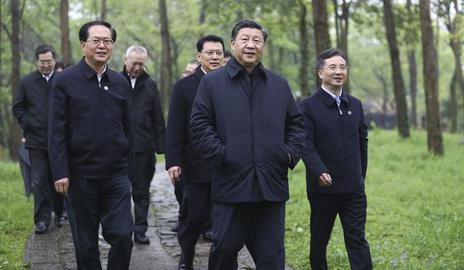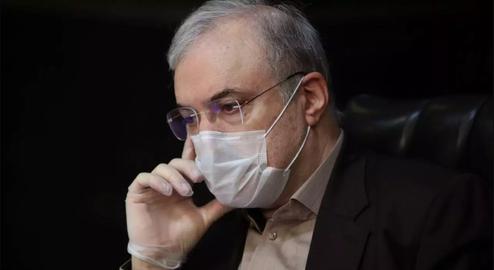Jianli Yang, a mathematician and human rights activist, survived China's Tiananmen Massacre in 1989, after which he left China for the United States. He returned in 2002 and was jailed between 2002 and 2007 for supporting the country's labor movement. He was intermittently held in solitary confinement for a total of 15 months – as detailed in a previous IranWire interview – and returned to the US after his release.
In a weekly series for IranWire, Jianli Yang analyses Chinese disinformation around the origin of coronavirus and its handling to date, and other recent affairs.
It’s been exactly a month since the European Union hardened its position against Chinese disinformation, directly accusing the Chinese state of being a key culprit in a “huge wave” of false narratives online that undermined both public health initiatives and the health of democracies worldwide, since the outset of the coronavirus pandemic.
On Wednesday, June 10, plans were announced by the European Commission – the EU’s legislative arm – to tackle disinformation. The report accused “foreign actors and certain third countries, in particular Russia and China” of engaging in “targeted influence operations and disinformation campaigns” in the EU. “I strongly believe that a geopolitically strong EU can only materialise if we are assertive,” Vĕra Jourová, a European commission vice-president, told reporters on Wednesday. “I believe if we have evidence we should not shy away from naming and shaming.”
Posts by Chinese officials and stories in Chinese state-media have included plenty of outright lies: from the oft-repeated claim that coronavirus originated in a US lab to an essay posted by a Chinese embassy in mid-April, which incensed French politicians, that French care workers had abandoned their posts and left residents to die. Since the beginning of the pandemic a core theme running through the narratives of Chinese officials and state-backed media has been to relentlessly portray Western democracies as in a state of diplomatic disarray: a tactic with which patience within the EU appears to be wearing thin.
Within days of this diplomatic hammer-blow, Twitter also announced the removal of some 23,750 accounts that were part of a “co-ordinated influence campaign”. These accounts, accompanied by another 150,000 “amplifier” accounts designed to boost and share that content, tweeted predominantly in Chinese and pushed, according to the platform, “geopolitical narratives favourable to the Communist Party of China”.
Coronavirus Fallout is Only Half the Story
With the dust now settling on both of these embarrassing episodes, it’s worth pausing to consider what the real incentive for China’s disinformation campaign might be. Regardless of which version of events one buys into, it is visible to all that the Chinese administration is facing widespread international annihilation over mishandling of Covid-19, and Chinese diplomats are leaving no stone unturned to repel the accusations with a vigour and aggression displayed never before.
What is, however, not visible to the world at large is that at the same time, the backdrop to this aggression is political insecurity within China itself. To the world, the President of China, Xi Jinping, may come across as a decisive leader who holds unchallenged supremacy within China and the confidence to take on the wider world. In reality, though, Xi and his administration are troubled by multiple challenges on the domestic front. These issues pose a threat not only to Xi’s position but to the Chinese Communist Party as a whole.
A major faultline lies within the very structure of the ruling Chinese Communist Party: the internal power struggle. There are various competing factions and camps within the Party: between those who can be broadly categorised as “princelings” and “commoners” who rose in the ranks through the Communist Youth League, as well as squabbles over influence between the incumbents, the retired leaders and the upcoming movers and shakers.
From the time he took over as the Party General Secretary (2012) and president of China (2013), Xi’s greatest fear has been the opposition he faced from within the Party circles. To crush it, he launched a massive anti-corruption drive, which engulfed in its fangs around two million officials. Alongside these high profile purges, Xi manifested his consolidation of power during the March 2018 Party Congress by rolling back the term limits for China’s president, paving the way for him to remain in power even beyond 2022: much in the same way as President Vladimir Putin has now done in Russia.
Although in appearance Xi seemed to have crushed his opposition, in reality he had actually created for himself deeper and stronger rivalry within the Party, which is seething for revenge. The Xi camp’s response to a recent proposal by premier Li Keqiang – China’s other top leader, who has considerable friction with Xi – that street vendors be reinstated to stave off mass poverty exacerbated by the pandemic, was to publish articles in Party mouthpieces including the Beijing Times, the Global Times and CCTV, claiming street stalls were “unhygienic and uncivilised” and warning the masses from being “influenced blindly by winds and trends”.
The slew of distorted narratives propagated by China during the pandemic is in part reactionary: the country stands rightly accused of having poorly managed the outbreak of a deadly virus, with devastating consequences for the international community, and is fighting tooth and nail to defend its image. But it is also a distraction technique. By sowing rumors of inter-EU and inter-Western discord and inefficiency, both in foreign-language media outlets and in Chinese-language campaigns at home, China is attempting to keep the spotlight away from its own internal political crisis. With the recent and ongoing wave of protests in Hong Kong, how long this will continue to be an effective smokescreen remains to be seen.
Also in this series:
Missing Data, Mud-Slinging and “Miracle Cures”: Why Disinformation Is Bad For Your Health
Iranian Online Network Still Peddling Coronavirus Disinformation
Putin’s Domestic Problems Eclipse Russian Disinformation Campaigns
China's Campaign to Protect President Xi against Coronavirus Criticism
Chinese Embassies Work Overtime to Diffuse International Fury Over Coronavirus
Russia Bans Coronavirus "Fake News" and Slams US Over Press Freedom
China Blocks Investigations Amid Refusal to Shut Down Wet Markets
From Coronavirus to the Second World War: On the Frontlines of the Russian Disinformation Battle
Russia Blames West for Propaganda While Reporting Unlikely Number of Covid-19 Deaths
As Criticism of China Falters, Time for a NATO for Human Rights?
Guest Post From Russia: How do You Put the Brakes on a Fake News Machine?
Has China Really Given Assent to a Global Coronavirus Review?
Russian Disinformation Back to Targeting Ukraine as Putin Declares Covid-19 Peak has Passed
Will the Post-Coronavirus World Stand Up to China's Bullying Business Tactics?
Coronavirus: An Opportunity to Advance Russian Interests in Latin America
The Shi Zhengli Identification Criteria: How Do We Know Where Coronavirus First Emerged?
Covid-19 and Black Lives Matter Unrest Targeted by Russian Disinformation
Occupy First, Talk Later: China Turns Border Conflict Into PR Opportunity
China Deploys Coercive Tactics to Deal with Disinformation Accusation
Putin Tries to Rewrite War History to Assert Russia's Position on the World Stage
Revealed: The Depth of China’s Influence on European News
Putin Can Stay: The Use of Disinformation in Russia’s Constitutional Vote
visit the accountability section
In this section of Iran Wire, you can contact the officials and launch your campaign for various problems

























comments